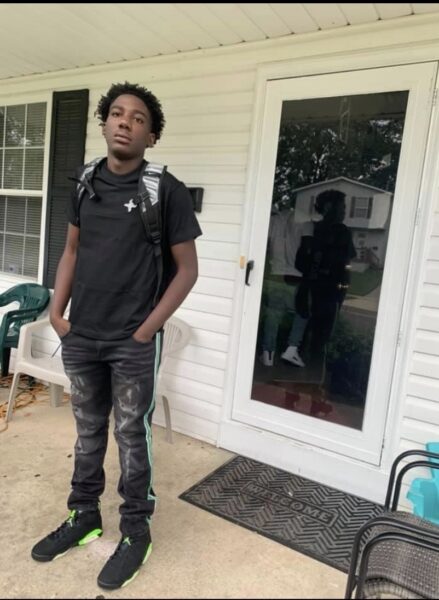
Dazuan Kidd (pictured right) recently celebrated his high school graduation from Akron’s Kenmore-Garfield High School. He graduated alongside his twin brother, Dameire. Also pictured is the boys’ mom, Ebony.
Dazuan Kidd isn’t unlike other 18-year-olds who recently attended their proms and high school graduations. What makes this recent Kenmore-Garfield High School grad different is he lives with a painful genetic condition called sickle cell disease. Sickle cell disease is a red blood cell disorder that causes red blood cells to become misshapen or “sickled” blocking and damaging small blood vessels – leading to significant pain and organ damage.
Due to his disease, Dazuan has missed countless days of school which made getting to his high school graduation all the more of a milestone celebration. But what made it even more special was getting to celebrate it alongside his best friend and twin brother, Dameire, who carries the sickle cell trait but does not have the disease.
“Dazuan had his first crisis when he was 11 months old,” says DaZuan’s mom, Ebony. “He wasn’t crying for any reason that I could identify, and this cry stood as different from any other cry I had heard before.”
Ebony took Dazuan to the emergency department at Akron Children’s where he was admitted.

Dazuan had his first hospitalization at age 11 months old for sickle cell disease.
“The doctors and nurses helped to educate me to recognize the signs of a pain crisis,” says Ebony. “As Dazuan got older he started understanding and knowing when something wasn’t right.”
Ebony says Dazuan’s team in the Showers Family Center for Childhood Cancer and Blood Disorders at Akron Children’s has been like a second family through his many hospitalizations, including his most recent one for a total hip replacement in 2020.
“Dazuan started limping and having pain in his left hip,” says Ebony. “They discovered the ball joint in his hip had deteriorated beyond repair and he was down to bone on bone.”
Although Dazuan had a 504 education plan in place that allowed him to make up missed schoolwork, he knew he would have to play a lot of catch up in order to complete his senior year and graduate with his class.
“He was the one who pushed himself to get it done,” says Ebony. “He was so excited to graduate.”

Dazuan on the first day of his senior year at Kenmore-Garfield High School in fall 2021. Dazuan had to make up a lot of schoolwork in order to graduate with his class after having hip replacement surgery in 2020.
Dr. Prasad Bodas, director of the sickle cell program and Dazuan’s pediatric hematologist-oncologist, says, “Today, in most cases we aim to manage, rather than cure sickle cell disease. Current therapies and management strategies allow children to live full and meaningful lives, despite their disease.”
“We see Dr. Bodas every 3-4 months to make sure all Dazuan’s levels are where they need to be,” says Ebony. “After experiencing a detached retina at age 7 that resulted in eye surgery, Dazuan also regularly sees his eye doctor.”
Dazuan has had fewer pain crises since he began taking hydroxyurea which helps his body produce fewer sickled red blood cells.
“For most patients, lifelong treatment with hydroxyurea can dramatically improve quality of life, daily functioning, and overall life span,” says Dr. Bodas. “Taking medicine every day isn’t always easy, but Dazuan has been a model patient and we are very proud of him.”
Dazuan also takes penicillin daily to help prevent infections and pain medicine when necessary.
“Dazuan knows that things like extreme temperatures and stress can exacerbate his pain, so he is careful about avoiding triggers,” says Ebony. “One thing he has been able to return to doing without pain since his hip replacement is running and playing basketball.”
Once Dazuan reaches age 21, his Akron Children’s team will help him transition from the childhood sickle cell program to an adult program where he will be monitored for the rest of his life.

Dazuan has been feeling much better since having his hip replaced. He can run and play basketball again. He’s pictured here dressed up for his senior prom.
“Managing sickle cell disease is a team effort, but Dazuan is our MVP. Our sickle cell team is fortunate to play a supporting role in his success thus far,” says Dr. Bodas. “Our goal is to help him and all our patients transition to a similarly supportive setting as an adult so he can continue to succeed well into old age.”
With graduation behind them, Dazuan and Dameire are each paving their own way, but their mom has no doubt they will remain close.
“Dameire is headed off to college and Dazuan has recently applied for a job at the Cleveland Clinic,” she says. “They both have bright futures ahead of them.”
Click here to learn more about the Sickle Cell Program at Akron Children’s.










